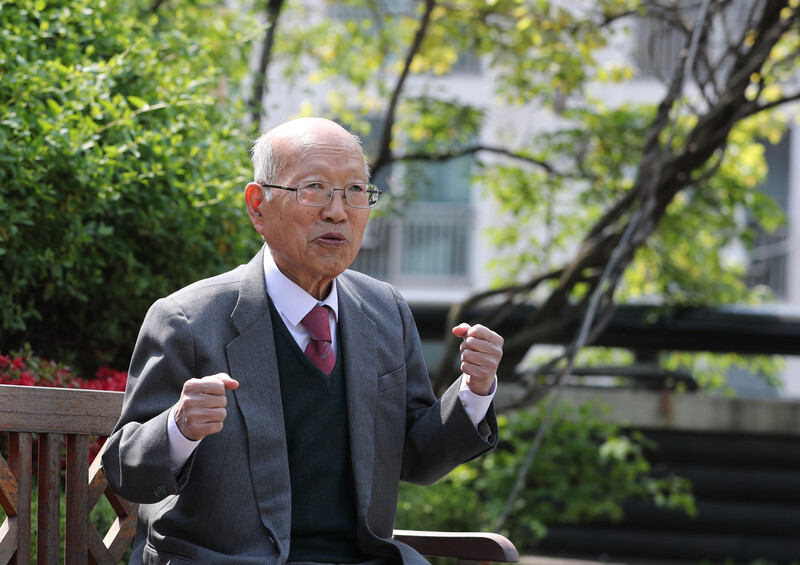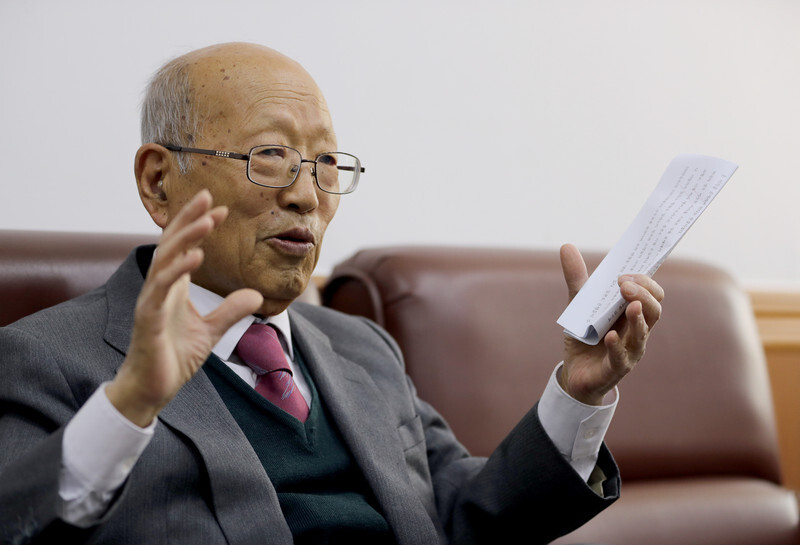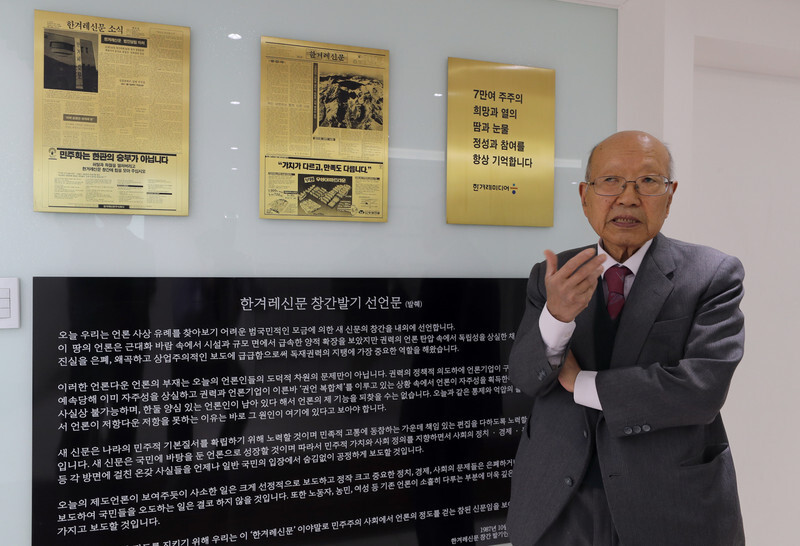hankyoreh
Links to other country sites 다른 나라 사이트 링크
[Interview] Recalling the Hankyoreh’s initial days to commemorate 10,000 issues

Hani: The Hankyoreh will be printing its 10,000th issue on May 18. What does it feel like to have been one of the main figures who established the newspaper?
Lim: I don’t think that there’s any inherent value in how long a newspaper has been around. That’s why I don’t think we should necessarily take pride in how many issues a newspaper has printed. Look at the Chosun Ilbo and the Dong-a Ilbo — they’ve been around for about a hundred years now. Even the Joongang Ilbo has been in operation for more than 50 years. But when we consider whether those newspapers are actually serving their proper role, it becomes clear that a newspaper’s age isn’t synonymous with its value.
If I were to choose the three [most significant] newspapers in Korean history, they would be the Tongnip Sinmun (1896-1899); the Chosun Joongang Ilbo (1933-1937), which was created by Lyuh Woon-hyung during the Japanese colonial occupation; and the Minjok Ilbo (Feb. 13-May 19, 1961), which was set up after the April Revolution in 1960. But the Tongnip Sinmun and the Chosun Joongang Ilbo didn’t last three years. The Minjok Ilbo barely lasted four months; it only printed 92 issues, falling short of a hundred. While I can’t deny that it’s gratifying as one of the Hankyoreh’s founders to see it last so much longer than those three newspapers, I don’t think that the 10,000th issue is anything to get excited about.
Hani: I guess what you’re saying is that printing the 10,000th issue is less important than the question of whether the newspaper is serving its proper role in Korean society.
Lim: I don’t think you could say the Hankyoreh has satisfied everyone. But I do think the Hankyoreh has given most Koreans something to look forward to and kept them from losing heart. Just looking at the past few years, I wonder whether the “candlelight revolution” (October 2017-April 2018) would have been possible, whether Moon Jae-in would have been elected president, and whether the National Assembly elections on Apr. 15 would have turned out the way they did if not for the Hankyoreh. I’m not just talking about political changes, either. The Hankyoreh has given hope to those who have been oppressed and to those who have suffered various kinds of discrimination. It has also contributed to the quest for peace by preventing the seeds of division from being sown on the Korean Peninsula. Obviously, we shouldn’t be complacent about where we are today, but we have reason to be proud.

Hankyoreh achieved through the efforts of everybody who resisted oppression
Hani: How would you describe the significance of the Hankyoreh’s establishment in 1988 in terms of Korean society and the history of the Korean press?
Lim: Narrowly speaking, it goes back to the Dong-a Ilbo and Chosun Ilbo’s struggle for freedom of the press in the mid-1970s and the mass layoffs of reporters during the military regime of Chun Doo-hwan in the 1980s. But more broadly, I like to think of the Hankyoreh as being the fruit of the entire nation’s demand to be liberated from the series of repressive regimes under Syngman Rhee, Park Chung-hee and Chun Doo-hwan. What I’m trying to say is that the Hankyoreh was the product of its time. In that sense, even the laid-off reporters who founded the Hankyoreh ought to be a little modest, in my opinion. It’s fine to take pride in putting everything on the line to make the newspaper, but the Hankyoreh was a product of its time and was achieved through the efforts of all Koreans who were suffering amid the repression of the military dictatorship. I’m saying that’s how we ought to see it.
Hani: You’ve said that the Hankyoreh was a product of its time. How would you sum up the zeitgeist of that era?
Lim: It was the idea that resisting political oppression is an inherent right. That’s the principle people are referring to nowadays when they talk about “popular sovereignty.” In short, sovereignty lies not with the president, but with the ordinary people of this land. That was also at the heart of the candlelight revolution. The protesters said that Park Geun-hye may be the president but she isn’t the sovereign, that she can’t do as she pleases, and that she needs to step down. That worked because of the principle of popular sovereignty. While that principle was around in the past, I think it started to flourish in Korean society around the time the Hankyoreh was being established.
Most people thought the Hankyoreh wouldn’t last long
Hani: From what I’m told, the media, both in Korea and abroad, took considerable interest in the establishment of the Hankyoreh.
Lim: That’s correct. Foreign newspapers and broadcasters raised doubts about whether the newspaper could stay in business. I remember Le Monde’s Seoul correspondent expressing considerable pessimism during a few meetings we had around that time. The correspondent pointed out that a newspaper like the Le Monde faced constant financial difficulties even in a country like France where there was a high degree of civic-mindedness and asked whether such a newspaper was feasible in Korea. The correspondent was doubtful about whether powerful forces in society such as the military, the chaebols, the bureaucracy, and even Korea’s three conservative papers [the Chosun Ilbo, the Joongang Ilbo, and the Dong-a Ilbo] would tolerate a newspaper like the Hankyoreh. But the amazing thing is that the Hankyoreh has survived for 32 years and is now publishing its 10,000th issue.

Hani: What response did you get from the local press?
Lim: When we held a party to celebrate our 100th issue at the Korean Press Center in September 1988, one of the guests was a publisher from one of the three major papers who will remain nameless. We shook hands, and he patted me on the shoulder and said, “So are you getting settled?” He wasn’t trying to cheer me up, though. The expression on his face made clear that he looked down on us and didn’t think we’d get very far. So I didn’t even dignify that with a response.
Hani: The Hankyoreh was the first newspaper in history to declare its independence from big business and political influence by reaching out to the masses for its initial funding. I suspect it wasn’t easy making the paper and running the company even at the very beginning.
Lim: Is Samsung running advertisements in the newspaper these days? What’s [your relationship] like?
Hani: Not really, because of our critical stories about [Samsung Electronics] Vice Chairman Lee Jae-yong.
Lim: For several years after the newspaper was established, Samsung wouldn’t even talk to us. Chaebols try to avoid hostile relations with media outlets, but Samsung took a hostile attitude toward the Hankyoreh. They didn’t only decline to take out advertising in the newspaper; they wouldn’t even meet with us. They turned down several of my requests for meetings. Their assumption was that we wouldn’t last very long, so it didn’t matter if we had an adversarial relationship. But their assumption was wrong. Not only did they get the Hankyoreh’s future wrong, but they also underestimated the Korean people.
Attempts by authorities to shut down the Hankyoreh
Hani: The newspaper faced some severe oppression during the Roh Tae-woo administration, didn’t it?
Lim: The two main incidents were editorial advisor Rhee Young-hui’s plan to do a reporting tour in North Korea and a reporter’s notebook about lawmaker Seo Gyeong-won’s trip to the North. In January 1989, Rhee tried to send a letter to North Korea via [a Japanese publisher called] Iwanami Shoten with the hope of arranging an interview with then North Korean leader Kim Il-sung. But when pastor Moon Ik-hwan’s surprise visit to Pyongyang that March stirred up security fears, Rhee cancelled his plans to visit the North. In fact, the letter wasn’t even delivered. Nevertheless, the ANSP [Agency for National Security Planning, now known as the National Intelligence Service] brought him in first on the charge of “praise and incitement” under the National Security Act and then brought me in, too. While the ANSP was questioning me, I realized that their goal was to have the Hankyoreh’s publishing license cancelled. Later I found out that Park Cheol-eon, the first state minister, had been visiting the North as a secret envoy for the Roh administration, which was working on the Inter-Korean Basic Agreement. The officials who were pushing for the agreement apparently were okay with the idea of the Hankyoreh being taken down but told the authorities to hold off because it wouldn’t help inter-Korean relations. So Rhee was put in jail and I was booked in an awkward attempt to tie my hands.
Hani: Didn’t you get raided by the ANSP during the Seo Gyeong-won incident?
Lim: Seo Gyeong-won, a lawmaker with the Peace Democratic Party, visited Pyongyang and met Kim Il-sung in August 1988 without even telling the party leadership. After learning about the visit, a reporter named Yun Jae-geol had done some reporting, but we were holding off on printing the story until the party went public with Seo’s trip. But in June 1989, Seo told the authorities about his visit and was put in jail. But the ANSP demanded that we turn over Yun’s notebook and threatened to charge us with failing to provide information about Suh’s visit to North Korea under the National Security Act. When we refused on the grounds that journalists are supposed to protect their sources, the ANSP sent a police squad to raid our editorial office early in the morning on July 12. Hankyoreh staff tried to block the entrance with their bodies, but the police broke through the metal doors and made off with the reporter’s notebook. I think the Roh administration made such a rash move after concluding that it had to do something about the Hankyoreh.
Hani: I take it that the Roh administration was eagerly looking for any excuse to cancel the publishing license of the world’s first newspaper funded by members of the public. What was the situation at the newspaper at the time?
Accepting disorder
Lim: I guess it’s time to stop tooting my own horn and be more candid. Because the Hankyoreh doesn’t have a majority stockholder, people often call us an “ownerless newspaper.” Others describe us as being disorderly. When everyone is talking at once, nothing gets done. You know how complicated it is to make a newspaper? You have to put out an issue every day, and even one typo is a problem. You’ve got to pay everyone’s salaries, too. In the middle of that complicated process, everyone is trying to get their opinion across. The company president is elected every three years, and the editor in chief is too. Each time, there are [various factions] cheering on their candidates. It makes you wonder whether the staff is there to make a newspaper or hold an election. What’s the situation like now? Anyway, the opposite of “disorderly” is “orderly,” of course — but is that really the kind of value to which a newspaper should aspire? It’s true that a disorderly environment has its challenges, but the Hankyoreh has always been like that. It couldn’t help being disorderly from its very creation. Since we weren’t trying to be an orderly newspaper, we decided to reconcile ourselves to the disorder.
Hani: In your front-page column commemorating the Hankyoreh’s 1,000th issue [on Aug. 10, 1991], you said, “I hope that the Hankyoreh will survive as the greatest public good of this age.” Do you think that the Hankyoreh is serving that function today?
News should be a public good, not a product
Lim: When we talk about a public good, we don’t mean a product. We shouldn’t think of a newspaper as a product that goes for 1,000 won [US$.82] a copy and 18,000 won [US$14.61] for a month’s subscription. For that reason, it can’t be subjected to the constraints of a normal product. Some people like to say that the Hankyoreh has brand power, but I disagree with that, too. I think we have to reject the power that comes from products. What’s a newspaper supposed to be then? It’s supposed to embody the values of its age. But even a public good can get stale, so it needs to stay relatable to its readers.
Hani: In closing, do you have any advice for the younger journalists who are carrying on your work?
Lim: I said at the beginning [of this interview] that the journalists who were laid off [in the 1980s] need to be a little more modest and not brag so much about how they created the Hankyoreh. In the same way, I think the Hankyoreh’s current staff and managers need to be a little more modest, too. I’m repeating myself here, but we need to remember that the Hankyoreh was the product of the passion and efforts of Koreans who longed for democratization. That’s what I’d like to tell them.
By Ahn Jae-seung, editorial writer
Please direct comments or questions to [english@hani.co.kr]

Editorial・opinion
![[Column] Season 2 of special prosecutor probe may be coming to Korea soon [Column] Season 2 of special prosecutor probe may be coming to Korea soon](https://flexible.img.hani.co.kr/flexible/normal/500/300/imgdb/original/2024/0426/3317141030699447.jpg) [Column] Season 2 of special prosecutor probe may be coming to Korea soon
[Column] Season 2 of special prosecutor probe may be coming to Korea soon![[Column] Park Geun-hye déjà vu in Yoon Suk-yeol [Column] Park Geun-hye déjà vu in Yoon Suk-yeol](https://flexible.img.hani.co.kr/flexible/normal/500/300/imgdb/original/2024/0424/651713945113788.jpg) [Column] Park Geun-hye déjà vu in Yoon Suk-yeol
[Column] Park Geun-hye déjà vu in Yoon Suk-yeol- [Editorial] New weight of N. Korea’s nuclear threats makes dialogue all the more urgent
- [Guest essay] The real reason Korea’s new right wants to dub Rhee a founding father
- [Column] ‘Choson’: Is it time we start referring to N. Korea in its own terms?
- [Editorial] Japan’s rewriting of history with Korea has gone too far
- [Column] The president’s questionable capacity for dialogue
- [Column] Are chaebol firms just pizza pies for families to divvy up as they please?
- [Column] Has Korea, too, crossed the Rubicon on China?
- [Correspondent’s column] In Japan’s alliance with US, echoes of its past alliances with UK
Most viewed articles
- 1After election rout, Yoon’s left with 3 choices for dealing with the opposition
- 2Two factors that’ll decide if Korea’s economy keeps on its upward trend
- 3Why Kim Jong-un is scrapping the term ‘Day of the Sun’ and toning down fanfare for predecessors
- 4Noting shared ‘values,’ Korea hints at passport-free travel with Japan
- 5AI is catching up with humans at a ‘shocking’ rate
- 6South Korea officially an aged society just 17 years after becoming aging society
- 7Korea’s 1.3% growth in Q1 signals ‘textbook’ return to growth, says government
- 8‘We must say no’: Seoul defense chief on Korean, USFK involvement in hypothetical Taiwan crisis
- 9Exchange rate, oil prices, inflation: Can Korea overcome an economic triple whammy?
- 10Japan officially says compensation of Korean forced laborers isn’t its responsibility